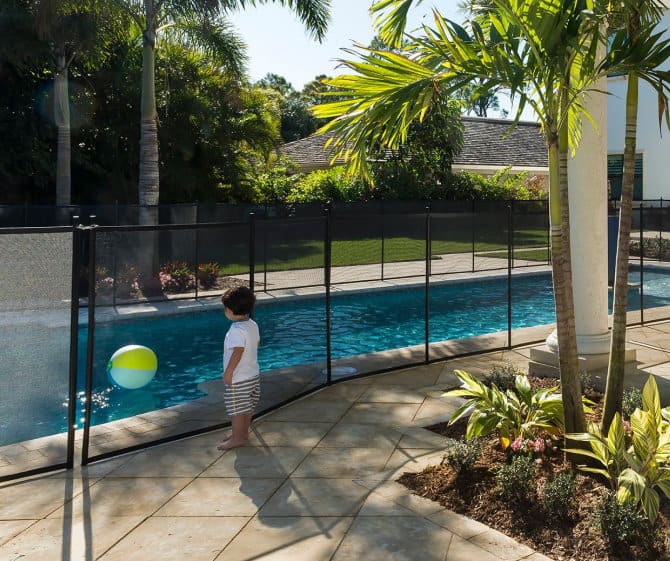Dreaming of a backyard oasis in the Bluegrass State often hits a roadblock when homeowners encounter the Kentucky pool permit process. What seems like a straightforward path to summer fun and family fitness with swimming pools can quickly become a maze of regulations, inspections, and potential rejections.
Understanding the Kentucky pool permit process before you break ground can save you thousands in costly revisions and weeks of frustrating delays. Let’s dive into what you need to know to get your pool project approved the first time around.
Contents
- Kentucky Regulations and Who Oversees Them
- Kentucky State Pool Safety Guidelines: Ensuring a Safe Swimming Environment
- Legal Requirements and Barriers
- Steps to Secure a Residential Pool Permit in Kentucky
- Common Reasons for Pool Permit Rejection
- Tips for Fast Approval of Kentucky Pool Permits
- Additional Considerations for Homeowners with Pools in Kentucky
- Moving Forward With Confidence
Kentucky Regulations and Who Oversees Them
In Kentucky, residential pool permits are handled by local building departments while public pools fall under the Kentucky Department for Public Health. Your county or city government manages the entire Kentucky pool permit process for backyard pools. These local authorities enforce both statewide standards and additional municipal codes specific to your area.
Before starting your pool project, check with your specific county building department and review these Tips for Pool Installations in Kentucky. Requirements vary significantly between Louisville, Lexington, and smaller communities. And if you live near the southwestern border, you may also want to check Pool Installations Across Tennessee.
For county-specific Kentucky Pool Permits, we’ve compiled a list of different area’s pool permit requirements and applications. This list does not include every region in Kentucky, so be sure to speak with your local authorities about your specific area.
- Anderson County, Kentucky – Pool Building Permit Application (PDF)
- Campbell County, Kentucky – Pool Permit Application (PDF)
- Park City, Kentucky – Building Permit for Swimming Pools (PDF)
- Kenton County (Covington), Kentucky – Pool Permit Requirements
- Shelbyville, Kentucky – Swimming Pool Permit Application (PDF)
- Warren County, Kentucky – Building Services Pool Permit Steps
- Scott County (Georgetown) – In-Ground Swimming Pool Permit Application
- Pendleton County, Kentucky – Residential Pool Permit Application
- Jessamine County of Wilmore, Kentucky – Swimming Pool Permit Application (PDF)
- Elizabethtown, Kentucky – Swimming Pool Plan Review and Permit Procedures
- Murray, Kentucky – Swimming Pool, Spa/Hot Tub Permit Application
- Franklin County, Kentucky – Swimming Pool Building Permit and Checklist
- Boone County, Kentucky – Residential Swimming Pool and Hot Tub Requirements
- Jefferson County (Louisville), Kentucky – In-Ground Swimming Pool Checklist
- Lexington, Kentucky – Homeowner Building and Pool Project Permit List
- Jeffersontown, Kentucky – Swimming Pool Enclosure Requirements and Permit Application
- Oldham County, Kentucky – Building and Swimming Pool Permit Information and Applications
- Mason County, Kentucky – Swimming Pool Building Permit Information
- Mason County (Maysville), Kentucky – Building Permit Application for Swimming Pools (PDF)
- Boyle County, Kentucky – Swimming Pool Building Permit (PDF)
- McCracken County, Kentucky (Paducah) – Swimming Pool Checklist and Application (PDF)
Kentucky State Pool Safety Guidelines: Ensuring a Safe Swimming Environment
Owning a pool in Kentucky offers relief from hot summer days and creates a place for family fun, fitness, and relaxation. But with the joy of ownership comes responsibility. Kentucky has implemented statewide safety regulations to protect swimmers and reduce the risk of accidents. Homeowners must follow these legal requirements to ensure their pools remain safe and compliant.

Legal Requirements and Barriers
Residential pool safety in Kentucky begins with proper fencing or barrier systems. State law requires that all in-ground and above-ground swimming pools:
- Be enclosed by a barrier that is at least 4 feet high
- Has no gaps wider than 4 inches and is designed so it cannot be easily climbed.
- Gates must be self-closing, self-latching, and installed with a latch at least 3 inches below the top of the gate to keep it out of reach of children.
These measures are not optional. They are legal mandates designed to prevent unauthorized access and accidental drownings.
Steps to Secure a Residential Pool Permit in Kentucky
The Kentucky pool permit process begins with submitting a completed application to your local building department. Most counties require a standard building permit application along with detailed pool plans. Fees vary by location; check with your local building department for exact costs.
Payment is usually due at submission, and most departments won’t review your application until fees are paid. Processing times can be longer during busy summer months; confirm current turnaround estimates with your local building department.
Required Site Plans for Kentucky’s Backyard Pools
Your site plan must show accurate property boundaries, existing structures, and the proposed pool location with measurements. Include setback distances from property lines and any easements.
- Barrier details: Must show fence height (minimum 48 inches), gate specifications (self-closing and self-latching), and spacing between vertical members (less than 4 inches)
- Property boundaries: Clear indication of lot lines with measurements
- Setbacks: Typically 5-10 feet minimum from property lines
Equipment Safety Standards
Kentucky pool permits also involve compliance with equipment safety standards. Drain covers must meet federal VGBA (Virginia Graeme Baker Pool & Spa Safety Act) requirements to prevent entrapment.
Electrical systems must be properly grounded, use GFCI (ground fault circuit interrupters), and be installed by licensed electricians. Annual inspections of electrical components are strongly recommended.
If you plan to add diving boards or slides, they must be installed according to manufacturer guidelines, with minimum depth requirements clearly marked. Professional installation is always the safest choice.
Scheduling Pool Inspections in Kentucky
Most Kentucky jurisdictions require at least three inspections during your pool installation. Call to schedule your first inspection after permit approval but before breaking ground.
Inspection wait times vary by county; contact your local office to determine when inspectors will be available. Schedule well in advance, especially during peak building season (April-August). Because of the busy spring and summer seasons for pool installations, we highly recommend winter swimming installations.
Common Reasons for Pool Permit Rejection
The most frequent permit rejections come from incomplete applications and inaccurate site plans. Missing measurements or inadequate drainage information will trigger immediate returns.
Using unlicensed contractors is another major red flag. Kentucky requires proper licensing for electrical and plumbing work related to pool installation.
Barrier and Safety Noncompliance for Pools – Easier Than You Think
Safety barriers cause the highest percentage of permit rejections in the Kentucky pool permit process. Your fence must be at least 48 inches tall with no gaps larger than 4 inches between vertical members.
Gates must open outward, away from the pool, and have self-closing, self-latching mechanisms at least 54 inches above ground. Pool alarms or safety covers may be required depending on your location.
Zoning Conflicts for Pools in Kentucky – Especially for Waterfront Property Owners
Check your local building codes for specific setback requirements regarding distances from property lines and structures. Pools cannot be placed in utility easements or rights-of-way.
Drainage is another common issue. Kentucky prohibits draining pool water into sanitary sewers in many counties. Your site plan must include a proper drainage plan, showing where backwash and excess water will flow. Waterfront property owners face additional regulations to prevent runoff contamination. Your application must show where backwash and drainage water will go.
Tips for Fast Approval of Kentucky Pool Permits
Contact your local building department before drawing up plans. Many offices offer pre-application consultations to clarify requirements specific to your property.
Verify that any contractors you’re working with hold current Kentucky licenses for their specific trades. Electrical work must be performed by licensed electricians.
Tip: Involve Experts Early
Consulting with a pool professional familiar with local codes can prevent costly mistakes. They can identify potential issues with your property before you invest in detailed plans.
Local building officials are often willing to answer questions before you submit. A quick call to clarify requirements can prevent automatic rejections for simple oversights in the Kentucky pool permit process.
- Pre-submission consultation: Many building departments offer free guidance
- Professional review: Having an expert check your plans before submission can save weeks of revisions
- Code verification: Confirm which version of the pool code your jurisdiction follows
Tip: Organize Documents Ahead of Application Submission
Create a checklist of all required documents before submitting your application. This typically includes:
- Property surveys
- Detailed pool plans
- Electrical diagrams
- Barrier specifications
- Contractor information
Having digital copies makes it easier to respond quickly if officials request additional information during the pool permit application process.
Additional Considerations for Homeowners with Pools in Kentucky
Seasonal Safety Considerations
Kentucky’s climate requires seasonal pool maintenance planning. Homeowners must properly winterize pools to avoid freeze damage, protect equipment, and ensure safe reopening in the spring. Failing to close a pool properly can result in costly repairs and permit complications.
For more information on how to reopen your pool after the winter cold is gone, visit our Reopening Your Pool guide.
Swimmer Safety Practices
Beyond construction, Kentucky emphasizes swimmer safety. Homeowners are encouraged to provide swimming lessons for children, maintain CPR certification, and keep rescue equipment on hand.
Rules against running or horseplay should be clearly posted, and visibility around the pool must remain unobstructed for effective supervision.

Chemical Safety and Water Quality
Maintaining balanced water chemistry is a legal and safety obligation. Kentucky health departments recommend regular water testing, professional assessments, and detailed maintenance records. Over-chlorination can be as dangerous as poor sanitation, so keep pH levels balanced for safe swimming.
Insurance and Liability Considerations
Owning a pool increases liability exposure. Kentucky homeowners are strongly encouraged to carry additional liability insurance, document all safety measures, and post visible safety signage. Some families also invest in umbrella insurance policies for extra protection.
Moving Forward With Confidence
Navigating Kentucky’s pool permit process requires attention to detail but doesn’t have to be overwhelming. Focus on complete documentation, proper safety barriers, and working with licensed professionals.
Most rejections are preventable with thorough preparation. When you’re ready to move forward with your pool project, Pool Brokers USA can help guide you through the process with our expertise in-ground pool installation.
We understand the unique requirements of Kentucky jurisdictions and can help you avoid common pitfalls while saving on costs. Our flexible financing options make your backyard dreams more affordable than you might think.
Request a Quote today to learn how we can support your pool project while helping you navigate the Kentucky pool permit process with confidence.
